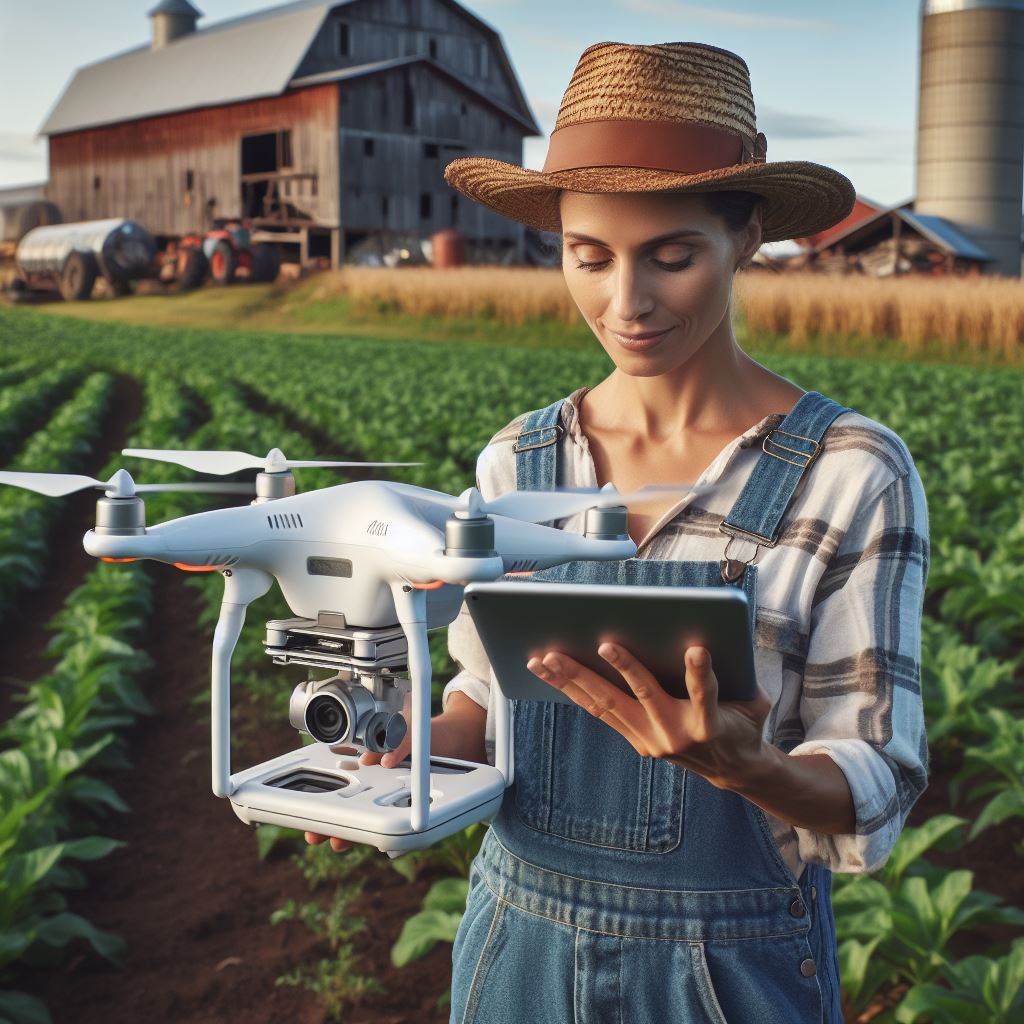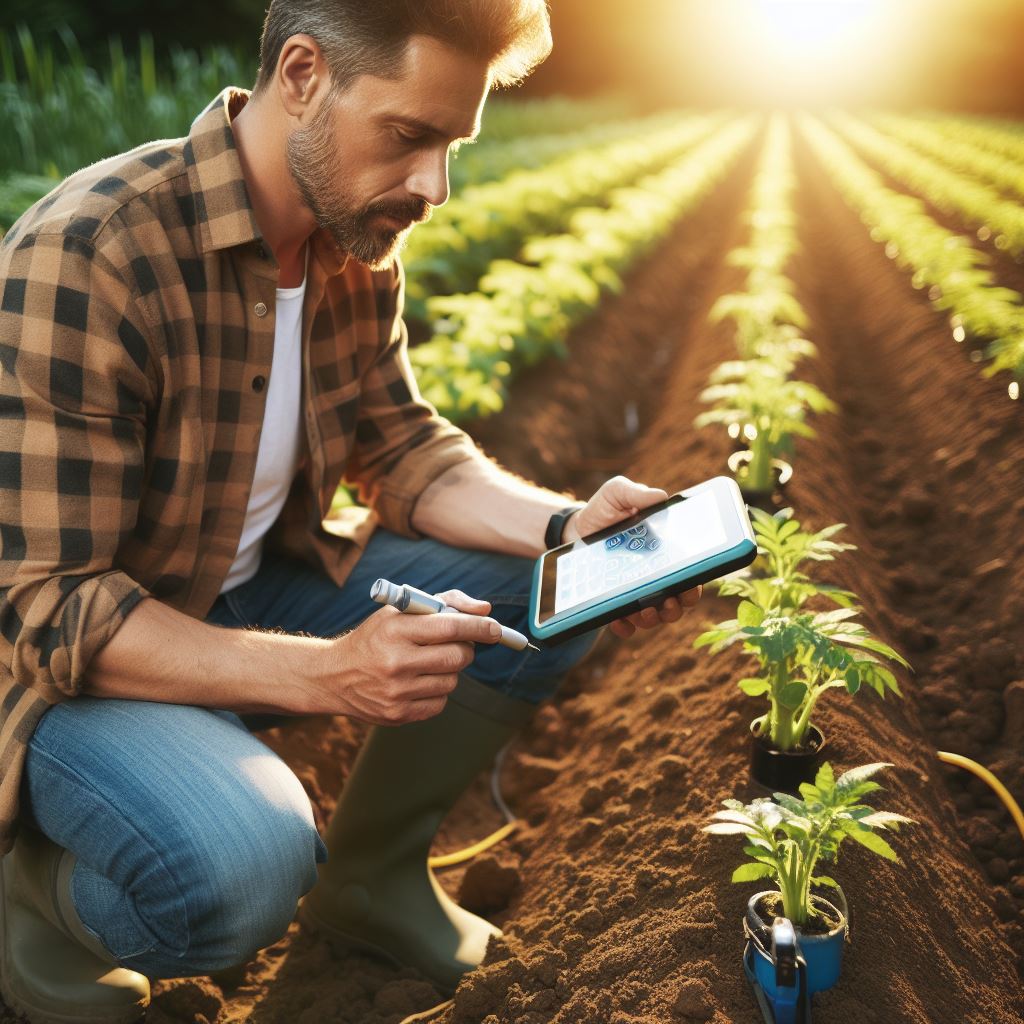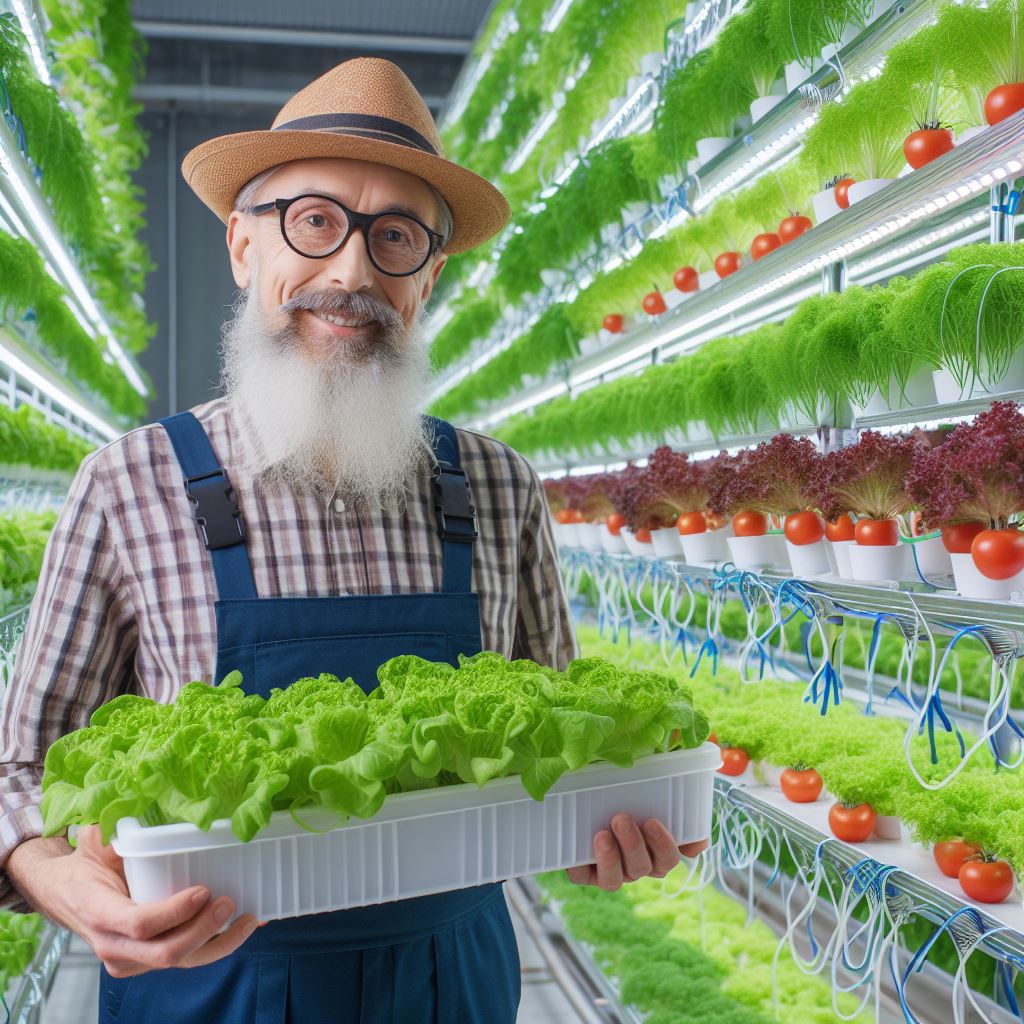Introduction
In recent years, agri drones have emerged as one of the most significant innovations in the field of agriculture.
These high-tech devices, equipped with advanced sensors and cameras, are revolutionizing the way farmers manage their crops and livestock.
Agri drones are changing the farming landscape by providing farmers with unprecedented levels of precision and efficiency.
Importance of agri drones in modern agriculture
The importance of agri drones in modern agriculture cannot be overstated.
These drones enable farmers to monitor their fields and livestock in real-time, identify potential issues, and take immediate action.
With their ability to capture high-resolution images and analyze data, agri drones can identify crop diseases, nutrient deficiencies, and even detect pest infestations.
This allows farmers to tackle problems at their early stages, preventing significant crop losses and reducing the need for harmful pesticides or excessive fertilizers.
Thesis statement: Agri drones are revolutionizing the farming landscape
Agri drones also help farmers optimize their irrigation systems.
By precisely mapping soil moisture levels, drones can provide valuable insights that enable farmers to irrigate their fields more efficiently, conserving water and reducing costs.
Furthermore, agri drones can also assist in the application of fertilizers and pesticides, ensuring accurate targeting and minimizing any potential environmental impacts.
Basically, the emergence of agri drones has brought about a paradigm shift in modern agriculture.
These technological marvels are transforming the way farmers work, enabling them to monitor their fields with precision and efficiency.
Agri drones are revolutionizing the farming landscape, leading to more sustainable and profitable farming practices.
Benefits of Agri Drones
Drones have revolutionized the agricultural industry by offering numerous benefits to farmers.
From increasing operational efficiency to cost-effectiveness, these unmanned aerial vehicles have reshaped the farming landscape.
Transform Your Agribusiness
Unlock your farm's potential with expert advice tailored to your needs. Get actionable steps that drive real results.
Get StartedIncreased efficiency in farm operations
One of the significant advantages of agri drones is the increased efficiency they bring to farm operations.
With drone technology, farmers can use seeding and planting techniques that lead to enhanced crop growth.
By accurately dispersing seeds and nutrients, drones ensure optimal utilization and distribution, resulting in higher yields.
Precision agriculture and mapping are other areas where agri drones prove their worth.
Equipped with advanced sensors and imaging technology, these drones can collect valuable field data and generate accurate maps.
Farmers can utilize this data to analyze soil conditions, crop health, and identify specific areas that may require intervention.
This enables them to make informed decisions regarding irrigation, fertilization, and disease control, leading to better crop management and higher productivity.
Cost-effective and time-saving advantages
Agri drones also offer cost-effective and time-saving advantages.
By reducing the need for manual labor, drones eliminate the arduous and time-consuming tasks that farmers would normally have to perform.
Drones can perform these tasks quickly and efficiently, freeing up valuable time for farmers to focus on other critical activities.
Moreover, the use of drones can significantly lower expenses for fertilizers and pesticides.
Drones allow farmers to precisely apply these substances only where necessary, minimizing wastage and reducing costs.
This targeted approach not only saves money but also minimizes environmental impact by minimizing chemical use.
Improved crop health monitoring
An important aspect of farming is monitoring crop health, and drones excel in this field as well.
With their ability to capture high-resolution images and collect data, drones can detect diseases and pests at an early stage.
By identifying these issues promptly, farmers can take the necessary measures to curb their spread and minimize crop damage.
Real-time data collection through drones further enhances the accuracy of interventions, ensuring that farmers can respond quickly and effectively to threats.
Generally, the benefits of agri drones are vast and transformative.
From increasing operational efficiency to saving time and money, these aerial vehicles have revolutionized the way farming is done.
With improved crop health monitoring and precise interventions, agri drones have proved to be a game-changer in the farming landscape.
Farmers who embrace this technology can expect higher yields, reduced expenses, and improved sustainability in their agricultural practices.
Read: Sky Farming: Drones and Their Impact
Challenges of Implementing Agri Drones
Agri drones have emerged as a game-changing technology in the agricultural landscape.
With their ability to monitor crops, apply pesticides, and collect valuable data, these unmanned aerial vehicles offer numerous benefits for farmers.
Showcase Your Farming Business
Publish your professional farming services profile on our blog for a one-time fee of $200 and reach a dedicated audience of farmers and agribusiness owners.
Publish Your ProfileHowever, their implementation poses several challenges that need to be addressed.
Regulatory framework and legal constraints
One of the primary challenges is the regulatory framework and legal constraints surrounding agri drones.
The Federal Aviation Administration (FAA) regulations and licensing requirements set limitations on their usage.
Farmers must abide by these rules, making it crucial to comply with safety measures and obtain the necessary permits.
Moreover, privacy concerns and public perception also present obstacles to the widespread adoption of agri drones.
People worry about their personal information being captured or misused by these aerial devices.
It is essential to have robust regulations in place to protect privacy rights and address public apprehensions.
Initial investment and technological barriers
Another hurdle is the initial investment and technological barriers associated with agri drones.
The high costs of acquiring and maintaining these advanced machines make them unaffordable for many farmers.
Additionally, specialized skill development and training are required to operate and manage the drones effectively.
Providing training programs and making drones more accessible can alleviate these barriers.
Environmental and ethical considerations
Environmental and ethical considerations also play a significant role in implementing agri drones.
Drones flying over agricultural fields have the potential to disturb wildlife and ecosystems.
Careful analysis of their impact on biodiversity is necessary to prevent any unintended consequences.
Ethical implications surrounding automation in agriculture, such as potential job displacements, also need to be taken into account to ensure fair practices.
Essentially, while agri drones offer immense potential in revolutionizing the farming landscape, several challenges must be overcome for their successful implementation.
Regulatory frameworks need to be adapted to address emerging technologies, ensuring safety and privacy.
Lowering the initial investment costs and providing training opportunities will make agri drones more accessible to farmers.
Furthermore, the environmental and ethical aspects of their usage should be thoroughly studied and addressed.
By doing so, the farming industry can reap the benefits of agri drones while minimizing their drawbacks.
Read: Drones in Agri: Changing Farming Dynamics

Discover More: The Impact of Drones on Crop Monitoring
Case Studies Showing Successful Drone Implementation
Agri drones have proven to revolutionize traditional farm practices, as demonstrated by these case studies.
The successful implementation of drone technology has brought about significant improvements in both crop yield and resource management.
Example 1: Bowles Farming Company
Integration of drones in pesticide and nutrient application
Bowles Farming Company, an agricultural enterprise operating in California, embraced the use of drones for various farming activities, particularly in pesticide and nutrient application.
By integrating drones into their operations, they experienced a remarkable increase in crop yield and cost optimization.
Enhanced yield and cost optimization
Drones enabled Bowles Farming Company to perform targeted pesticide application on specific areas of their fields.
This precision application reduced the overall use of pesticides while effectively controlling pests.
Additionally, drones allowed for the efficient distribution of nutrients, ensuring that crops received optimal nourishment.
The utilization of drones in these activities led to healthier plants, improved crop yield, and reduced dependence on chemical inputs.
Moreover, the implementation of agri drones brought about significant cost savings for Bowles Farming Company.
By using drones for pesticide and nutrient application, they minimized waste and decreased the need for excessive manual labor.
This ultimately translated into reduced operational costs and higher profitability for the company.
Example 2: Boschendal Wine Estate
Remote monitoring and analysis of soil moisture levels
Boschendal Wine Estate, a renowned winemaker in South Africa, utilized agri drones to enhance their irrigation management practices.
By adopting drone technology, they were able to remotely monitor and analyze soil moisture levels across their vineyards.
Precise irrigation system adjustment and water conservation
The drones equipped with advanced sensors and imaging capabilities provided real-time data on soil moisture, allowing Boschendal Wine Estate to make informed irrigation decisions.
With this information, they could precisely adjust their irrigation systems, ensuring that the vineyards received the right amount of water at the right time.
The ability to optimize irrigation through drone technology resulted in improved crop quality and increased overall vineyard productivity.
An additional benefit of using agri drones for irrigation management was water conservation.
By accurately measuring soil moisture levels, Boschendal Wine Estate could avoid over-irrigation, minimizing water wastage.
Showcase Your Farming Business
Publish your professional farming services profile on our blog for a one-time fee of $200 and reach a dedicated audience of farmers and agribusiness owners.
Publish Your ProfileThis sustainable approach not only preserved valuable resources but also aligned with their commitment to environmental stewardship.
In general, these case studies highlight the successful implementation of drones in the agricultural industry.
Bowles Farming Company and Boschendal Wine Estate effectively harnessed drone technology to enhance their farming practices, resulting in increased crop yield, cost optimization, efficient irrigation management, and water conservation.
These examples demonstrate the significant and positive impact that agri drones can have on the farming landscape, making them an invaluable tool for modern farmers.
Read: Agri Drones: From Planting to Harvesting
The Future of Agri Drones
Technological advancements and innovation
In recent years, the agriculture industry has seen a significant shift towards the use of drones to enhance farming practices.
Agri drones, also known as agricultural drones or farming drones, are unmanned aerial vehicles (UAVs) used for various agricultural purposes.
With technological advancements and innovation, the future of agri drones looks promising.
Development of autonomous drone systems
One of the key developments in agri drones is the advancement of autonomous drone systems.
These drones are equipped with advanced sensors, GPS technology, and sophisticated software that enable them to perform tasks autonomously.
For example, they can plant seeds in predetermined patterns or accurately spray fertilizers and pesticides on specific crops.
The ability of drones to operate on their own reduces labor costs and improves overall efficiency in farming operations.
Integration of artificial intelligence and data analytics
Furthermore, the integration of artificial intelligence (AI) and data analytics has revolutionized the capabilities of agri drones.
AI algorithms enable drones to identify and classify different types of crops, pests, and diseases.
This information can be combined with data analytics to generate actionable insights for farmers.
For instance, drones equipped with multispectral sensors can detect early signs of nutrient deficiencies or pest infestations, enabling farmers to take timely corrective actions.
The use of AI and data analytics not only improves crop health but also optimizes resource utilization, reducing waste and increasing profitability.
Potential impacts on the farming industry
Increased crop production and food security
The potential impacts of agri drones on the farming industry are immense.
Firstly, the increased use of drones can lead to a significant boost in crop production.
Drones can monitor crops more efficiently and accurately than traditional methods.
They can collect data on soil conditions, moisture levels, and plant health, allowing farmers to make informed decisions regarding irrigation, fertilization, and pest control.
As a result, crop yields can be maximized, contributing to improved food security for a growing global population.
Shifting role of farmers towards drone operation and data analysis
Secondly, the emergence of agri drones will require farmers to adapt their skill sets.
While traditional farming techniques will still be relevant, farmers will need to acquire knowledge in drone operation and data analysis.
They will become aerial agronomists, leveraging the data collected by drones to optimize their farming practices.
This shift in the role of farmers opens up new opportunities for employment and specialization within the agriculture industry.
In essence, the future of agri drones looks promising due to technological advancements and innovation.
The development of autonomous drone systems and the integration of AI and data analytics are transforming the way farming is done.
The potential impacts on the farming industry include increased crop production, improved food security, and the shifting role of farmers towards drone operation and data analysis.
As the adoption of agri drones continues to grow, the farming landscape will experience significant changes, benefiting both farmers and consumers.
Read: Drones in Agri: Boosting Crop Efficiency
Conclusion
Agri drones have proven to be advantageous in terms of data collection, crop monitoring, and pest control.
However, challenges related to regulations, data privacy, and cost effectiveness need to be addressed.
Despite the hurdles, the potential of agri drones to revolutionize agriculture is promising.
With advancements in technology and increased adoption, these drones can immensely contribute to increasing crop yields, improving efficiency, and reducing environmental impact.
In a nutshell, agri drones offer numerous benefits, such as precise crop monitoring, improved decision-making, and reduced labor costs.
While challenges and concerns exist, the advantages they bring to agriculture are immense.
It is crucial to address the limitations and work towards a regulatory framework that promotes responsible drone usage.
With continuous development, agri drones have the potential to reshape the farming landscape and contribute to a sustainable future for agriculture.




